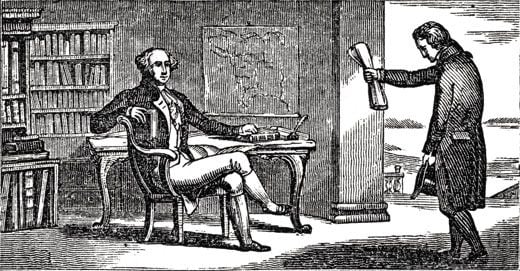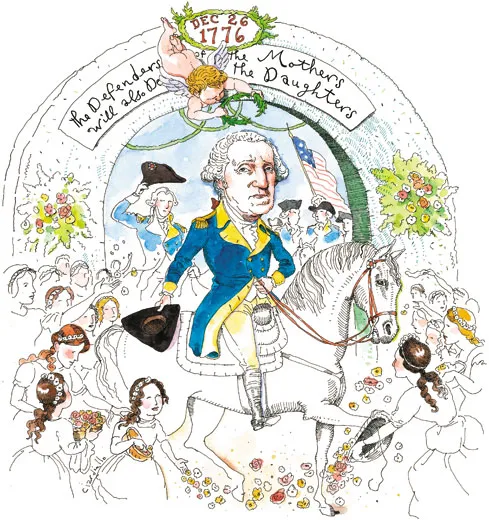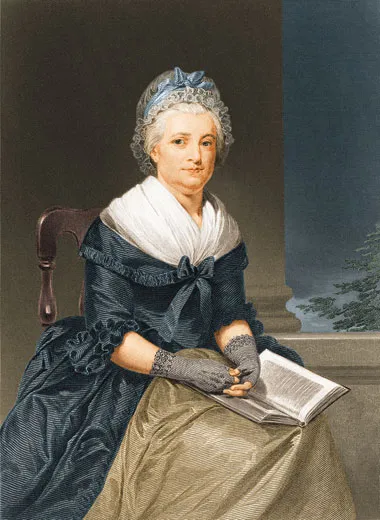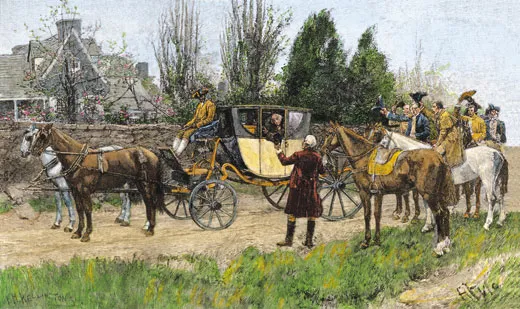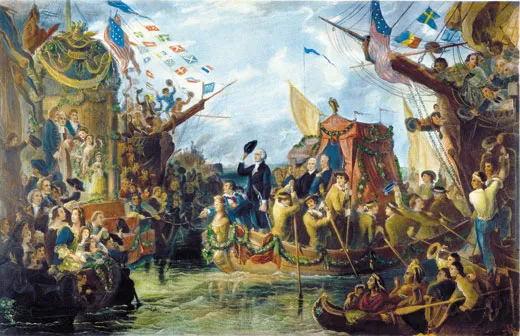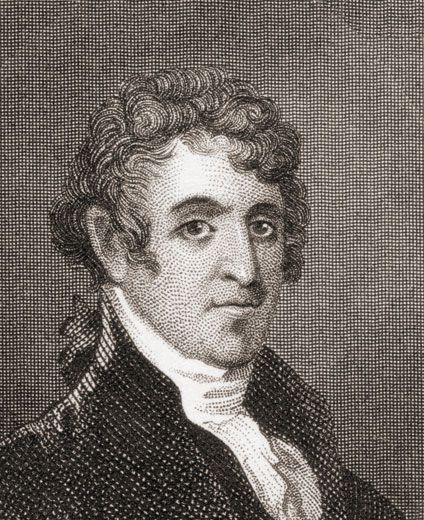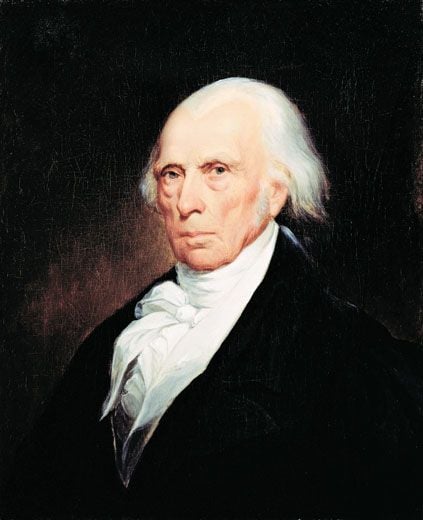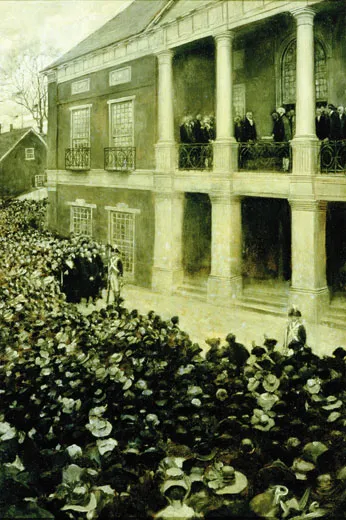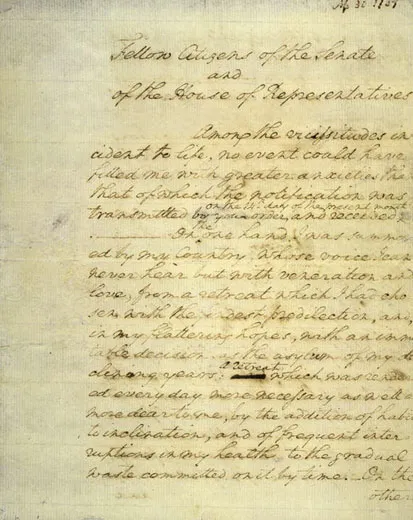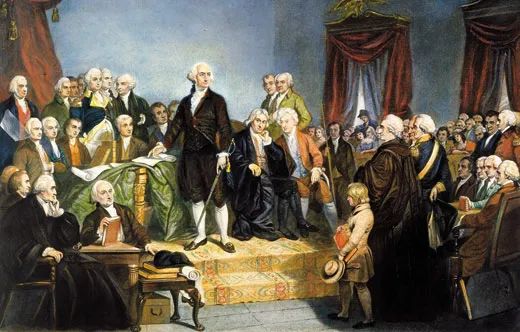George Washington: The Reluctant President
It seemed as if everyone rejoiced at the election of our first chief executive except the man himself
/https://tf-cmsv2-smithsonianmag-media.s3.amazonaws.com/filer/Washington-illustration-631.jpg)
Editor’s note: Even as the Constitution was being ratified, Americans looked toward a figure of singular probity to fill the new office of the presidency. On February 4, 1789, the 69 members of the Electoral College made George Washington the only chief executive to be unanimously elected. Congress was supposed to make the choice official that March but could not muster a quorum until April. The reason—bad roads—suggests the condition of the country Washington would lead. In a new biography, Washington: A Life, Ron Chernow has created a portrait of the man as his contemporaries saw him. The excerpt below sheds light on the president’s state of mind as the first Inauguration Day approached.
The Congressional delay in certifying George Washington’s election as president only allowed more time for doubts to fester as he considered the herculean task ahead. He savored his wait as a welcome “reprieve,” he told his former comrade in arms and future Secretary of War Henry Knox, adding that his “movements to the chair of government will be accompanied with feelings not unlike those of a culprit who is going to the place of his execution.” His “peaceful abode” at Mount Vernon, his fears that he lacked the requisite skills for the presidency, the “ocean of difficulties” facing the country—all gave him pause on the eve of his momentous trip to New York. In a letter to his friend Edward Rutledge, he made it seem as if the presidency was little short of a death sentence and that, in accepting it, he had given up “all expectations of private happiness in this world.”
The day after Congress counted the electoral votes, declaring Washington the first president, it dispatched Charles Thomson, the secretary of Congress, to bear the official announcement to Mount Vernon. The legislators had chosen a fine emissary. A well-rounded man, known for his work in astronomy and mathematics, the Irish-born Thomson was a tall, austere figure with a narrow face and keenly penetrating eyes. He couldn’t have relished the trying journey to Virginia, which was “much impeded by tempestuous weather, bad roads, and the many large rivers I had to cross.” Yet he rejoiced that the new president would be Washington, whom he venerated as someone singled out by Providence to be “the savior and father” of the country. Having known Thomson since the Continental Congress, Washington esteemed him as a faithful public servant and exemplary patriot.
Around noon on April 14, 1789, Washington flung open the door at Mount Vernon and greeted his visitor with a cordial embrace. Once in the privacy of the mansion, he and Thomson conducted a stiff verbal minuet, each man reading from a prepared statement. Thomson began by declaring, “I am honored with the commands of the Senate to wait upon your Excellency with the information of your being elected to the office of President of the United States of America” by a unanimous vote. He read aloud a letter from Senator John Langdon of New Hampshire, the president pro tempore. “Suffer me, sir, to indulge the hope that so auspicious a mark of public confidence will meet your approbation and be considered as a sure pledge of the affection and support you are to expect from a free and enlightened people.” There was something deferential, even slightly servile, in Langdon’s tone, as if he feared that Washington might renege on his promise and refuse to take the job. Thus was greatness once again thrust upon George Washington.
Any student of Washington’s life might have predicted that he would acknowledge his election in a short, self-effacing speech full of disclaimers. “While I realize the arduous nature of the task which is conferred on me and feel my inability to perform it,” he replied to Thomson, “I wish there may not be reason for regretting the choice. All I can promise is only that which can be accomplished by an honest zeal.” This sentiment of modesty jibed so perfectly with Washington’s private letters that it could not have been feigned: he wondered whether he was fit for the post, so unlike anything he had ever done. The hopes for republican government, he knew, rested in his hands. As commander in chief, he had been able to wrap himself in a self-protective silence, but the presidency would leave him with no place to hide and expose him to public censure as nothing before.
Because the vote counting had been long delayed, Washington, 57, felt the crush of upcoming public business and decided to set out promptly for New York on April 16, accompanied in his elegant carriage by Thomson and aide David Humphreys. His diary entry conveys a sense of foreboding: “About ten o’clock, I bade adieu to Mount Vernon, to private life, and to domestic felicity and, with a mind oppressed with more anxious and painful sensations than I have words to express, set out for New York...with the best dispositions to render service to my country in obedience to its call, but with less hope of answering its expectations.” Waving goodbye was Martha Washington, who wouldn’t join him until mid-May. She watched her husband of 30 years depart with a mixture of bittersweet sensations, wondering “when or whether he will ever come home again.” She had long doubted the wisdom of this final act in his public life. “I think it was much too late for him to go into public life again,” she told her nephew, “but it was not to be avoided. Our family will be deranged as I must soon follow him.”
Determined to travel rapidly, Washington and his entourage set out each day at sunrise and put in a full day on the road. Along the way he hoped to keep ceremonial distractions to a minimum, but he was soon disabused: eight exhausting days of festivities lay ahead. He had only traveled ten miles north to Alexandria when the townspeople waylaid him with a dinner, lengthened by the mandatory 13 toasts. Adept at farewells, Washington was succinctly eloquent in response. “Unutterable sensations must then be left to more expressive silence, while, from an aching heart, I bid you all, my affectionate friends and kind neighbors, farewell.”
Before long, it was apparent that Washington’s journey would form the republican equivalent of the procession to a royal coronation. As if already a seasoned politician, he left a trail of political promises in his wake. While in Wilmington, he addressed the Delaware Society for Promoting Domestic Manufacturers and imparted a hopeful message. “The promotion of domestic manufactures will, in my conception, be among the first consequences which may naturally be expected to flow from an energetic government.” Arriving in Philadelphia, he was met by local dignitaries and asked to mount a white horse for his entry into town. When he crossed a bridge over the Schuylkill, it was wreathed with laurels and evergreens, and a cherubic boy, aided by a mechanical device, lowered a laurel crown over his head. Recurrent cries of “Long Live George Washington” confirmed what his former aide James McHenry had already told him before he left Mount Vernon: “You are now a king under a different name.”
As Washington entered Philadelphia, he found himself, willy-nilly, at the head of a full-scale parade, with 20,000 people lining the streets, their eyes fixed on him in wonder. “His Excellency rode in front of the procession, on horseback, politely bowing to the spectators who filled the doors and windows by which he passed,” reported the Federal Gazette, noting that church bells rang as Washington proceeded to his old haunt, the City Tavern. After the bare-knuckled fight over the Constitution, the newspaper editorialized, Washington had united the country. “What a pleasing reflection to every patriotic mind, thus to see our citizens again united in their reliance on this great man who is, a second time, called upon to be the savior of his country!” By the next morning, Washington had grown tired of the jubilation. When the light horse cavalry showed up to accompany him to Trenton, they discovered he had left the city an hour earlier “to avoid even the appearance of pomp or vain parade,” reported one newspaper.
As Washington approached the bridge over Assunpink Creek in Trenton, the spot where he had stood off the British and Hessians, he saw that the townsfolk had erected a magnificent floral arch in his honor and emblazoned it with the words “December 26, 1776” and the proclamation “The Defender of the Mothers will also Defend the Daughters.” As he rode closer, 13 young girls, robed in spotless white, walked forward with flower-filled baskets, scattering petals at his feet. Astride his horse, tears standing in his eyes, he returned a deep bow as he noted the “astonishing contrast between his former and actual situation at the same spot.” With that, three rows of women—young girls, unmarried ladies and married ones—burst into a fervent ode on how he had saved fair virgins and matrons alike. The adulation only quickened Washington’s self-doubt. “I greatly apprehend that my countrymen will expect too much from me,” he wrote to Rutledge. “I fear, if the issue of public measures should not correspond with their sanguine expectations, they will turn the extravagant...praises which they are heaping upon me at this moment into equally extravagant...censures.” There was no way, it seemed, that he could dim expectations or escape public reverence.
By now sated with adulation, Washington preserved a faint hope that he would be allowed to make an inconspicuous entry into New York. He had pleaded with Gov. George Clinton to spare him further hoopla: “I can assure you, with the utmost sincerity, that no reception can be so congenial to my feelings as a quiet entry devoid of ceremony.” But he was fooling himself if he imagined he might slip unobtrusively into the temporary capital. Never reconciled to the demands of his celebrity, Washington still fantasized that he could shuck that inescapable burden. When he arrived at Elizabethtown, New Jersey, on April 23, he beheld an impressive phalanx of three senators, five congressmen and three state officials awaiting him. He must have intuited, with a sinking sensation, that this welcome would eclipse even the frenzied receptions in Philadelphia and Trenton. Moored to the wharf was a special barge, glistening with fresh paint, constructed in his honor and equipped with an awning of red curtains in the rear to shelter him from the elements. To nobody’s surprise, the craft was steered by 13 oarsmen in spanking white uniforms.
As the barge drifted into the Hudson River, Washington made out a Manhattan shoreline already “crowded with a vast concourse of citizens, waiting with exulting anxiety his arrival,” a local newspaper said. Many ships anchored in the harbor were garlanded with flags and banners for the occasion. If Washington gazed back at the receding Jersey shore, he would have seen that his craft led a huge flotilla of boats, including one bearing the portly figure of Gen. Henry Knox. Some boats carried musicians and female vocalists on deck, who serenaded Washington across the waters. “The voices of the ladies were...superior to the flutes that played with the stroke of the oars in Cleopatra’s silken-corded barge,” was the imaginative verdict of the New York Packet. These wafted melodies, united with repeated cannon roar and thunderous acclaim from crowds onshore, again oppressed Washington with their implicit message of high expectations. As he confided to his diary, the intermingled sounds “filled my mind with sensations as painful (considering the reverse of this scene, which may be the case after all my labors to do good) as they are pleasing.” So as to guard himself against later disappointment, he didn’t seem to allow himself the smallest iota of pleasure.
When the presidential barge landed at the foot of Wall Street, Governor Clinton, Mayor James Duane, James Madison and other luminaries welcomed him to the city. The officer of a special military escort stepped forward briskly and told Washington that he awaited his orders. Washington again labored to cool the celebratory mood, which burst forth at every turn. “As to the present arrangement,” he replied, “I shall proceed as is directed. But after this is over, I hope you will give yourself no further trouble, as the affection of my fellow-citizens is all the guard I want.” Nobody seemed to take the hint seriously.
The streets were solidly thronged with well-wishers and it took Washington a half-hour to arrive at his new residence at 3 Cherry Street, tucked away in the northeast corner of the city, a block from the East River, near the present-day Brooklyn Bridge. One week earlier, the building’s owner, Samuel Osgood, had agreed to allow Washington to use it as the temporary presidential residence. From the descriptions of Washington’s demeanor en route to the house, he finally surrendered to the general mood of high spirits, especially when he viewed the legions of adoring women. As New Jersey Representative Elias Boudinot told his wife, Washington “frequently bowed to the multitude and took off his hat to the ladies at the windows, who waved their handkerchiefs and threw flowers before him and shed tears of joy and congratulation. The whole city was one scene of triumphal rejoicing.”
Though the Constitution said nothing about an inaugural address, Washington, in an innovative spirit, contemplated such a speech as early as January 1789 and asked a “gentleman under his roof”—David Humphreys—to draft one. Washington had always been economical with words, but the collaboration with Humphreys produced a wordy document, 73 pages long, which survives only in tantalizing snippets. In this curious speech, Washington spent a ridiculous amount of time defending his decision to become president, as if he stood accused of some heinous crime. He denied that he had accepted the presidency to enrich himself, even though nobody had accused him of greed. “In the first place, if I have formerly served the community without a wish for pecuniary compensation, it can hardly be suspected that I am at present influenced by avaricious schemes.” Addressing a topical concern, he disavowed any desire to found a dynasty, citing his childless state. Closer in tone to future inaugural speeches was Washington’s ringing faith in the American people. He devised a perfect formulation of popular sovereignty, writing that the Constitution had brought forth “a government of the people: that is to say, a government in which all power is derived from, and at stated periods reverts to, them—and that, in its operation...is purely a government of laws made and executed by the fair substitutes of the people alone.”
This ponderous speech never saw the light of day. Washington sent a copy to James Madison, who wisely vetoed it on two counts: that it was much too long and that its lengthy legislative proposals would be interpreted as executive meddling with the legislature. Instead, Madison helped Washington draft a far more compact speech that avoided the tortured introspection of its predecessor. A whirlwind of energy, Madison would seem omnipresent in the early days of Washington’s administration. Not only did he help draft the inaugural address, he also wrote the official response by Congress and then Washington’s response to Congress, completing the circle. This established Madison, despite his role in the House, as a pre-eminent adviser and confidant to the new president. Oddly enough, he wasn’t troubled that his advisory relationship to Washington might be construed as violating the separation of powers.
Washington knew that everything he did at the swearing-in would establish a tone for the future. “As the first of everything in our situation will serve to establish a precedent,” he reminded Madison, “it is devoutly wished on my part that these precedents may be fixed on true principles.” He would shape indelibly the institution of the presidency. Although he had earned his reputation in battle, he made a critical decision not to wear a uniform at the inauguration or beyond, banishing fears of a military coup. Instead, he would stand there aglitter with patriotic symbols. To spur American manufactures, he would wear a double-breasted brown suit, made from broadcloth woven at the Woolen Manufactory of Hartford, Connecticut. The suit had gilt buttons with an eagle insignia on them; to round out his outfit, he would wear white hosiery, silver shoe buckles and yellow gloves. Washington already sensed that Americans would emulate their presidents. “I hope it will not be a great while before it will be unfashionable for a gentleman to appear in any other dress,” he told his friend the Marquis de Lafayette, referring to his American attire. “Indeed, we have already been too long subject to British prejudices.” To burnish his image further on Inauguration Day, Washington would powder his hair and wear a dress sword on his hip, sheathed in a steel scabbard.
The inauguration took place at the building at Wall and Nassau streets that had long served as New York’s City Hall. It came richly laden with historical associations, having hosted John Peter Zenger’s trial in 1735, the Stamp Act Congress of 1765 and the Confederation Congress from 1785 to 1788. Starting in September 1788, the French engineer Pierre-Charles L’Enfant had remodeled it into Federal Hall, a suitable home for Congress. L’Enfant introduced a covered arcade at street level and a balcony surmounted by a triangular pediment on the second story. As the people’s chamber, the House of Representatives was accessible to the public, situated in a high-ceilinged octagonal room on the ground floor, while the Senate met in a second-floor room on the Wall Street side, buffering it from popular pressure. From this room Washington would emerge onto the balcony to take the oath of office. In many ways, the first inauguration was a hasty, slapdash affair. As with all theatrical spectacles, rushed preparations and frantic work on the new building continued until a few days before the event. Nervous anticipation spread through the city as to whether the 200 workmen would complete the project on time. Only a few days before the inauguration, an eagle was hoisted onto the pediment, completing the building. The final effect was stately: a white building with a blue and white cupola topped by a weather vane.
A little after noon on April 30, 1789, following a morning filled with clanging church bells and prayers, a contingent of troops on horseback, accompanied by carriages loaded with legislators, stopped at Washington’s Cherry Street residence. Escorted by David Humphreys and aide Tobias Lear, the president-elect stepped into his appointed carriage, which was trailed by foreign dignitaries and throngs of joyous citizens. The procession wound slowly through the narrow Manhattan streets, emerging 200 yards from Federal Hall. After alighting from his carriage, Washington strode through a double line of soldiers to the building and mounted to the Senate chamber, where members of Congress awaited him expectantly. As he entered, Washington bowed to both houses of the legislature—his invariable mark of respect—then occupied an imposing chair up front. A profound hush settled on the room. Vice President John Adams rose for an official greeting, then informed Washington that the epochal moment had arrived. “Sir, the Senate and House of Representatives are ready to attend you to take the oath required by the Constitution.” “I am ready to proceed,” Washington replied.
As he stepped through the door onto the balcony, a spontaneous roar surged from the multitude tightly squeezed into Wall and Broad streets and covering every roof in sight. This open-air ceremony would confirm the sovereignty of the citizens gathered below. Washington’s demeanor was stately, modest and deeply affecting: he clapped one hand to his heart and bowed several times to the crowd. Surveying the serried ranks of people, one observer said they were jammed so closely together “that it seemed one might literally walk on the heads of the people.” Thanks to his simple dignity, integrity and unrivaled sacrifices for his country, Washington’s conquest of the people was complete. A member of the crowd, the Count de Moustier, the French minister, noted the solemn trust between Washington and the citizens who stood packed below him with uplifted faces. As he reported to his government, never had a “sovereign reigned more completely in the hearts of his subjects than did Washington in those of his fellow citizens...he has the soul, look and figure of a hero united in him.” One young woman in the crowd echoed this when she remarked, “I never saw a human being that looked so great and noble as he does.” Only Congressman Fisher Ames of Massachusetts noted that “time has made havoc” upon Washington’s face, which already looked haggard and careworn.
The sole constitutional requirement for the swearing-in was that the president take the oath of office. That morning, a Congressional committee decided to add solemnity by having Washington place his hand on a Bible during the oath, leading to a frantic, last-minute scramble to locate one. A Masonic lodge came to the rescue by providing a thick Bible, bound in deep brown leather and set on a crimson velvet cushion. By the time Washington appeared on the portico, the Bible rested on a table draped in red.
The crowd grew silent as New York Chancellor Robert R. Livingston administered the oath to Washington, who was visibly moved. As the president finished the oath, he bent forward, seized the Bible and brought it to his lips. Washington felt this moment from the bottom of his soul: one observer noted the “devout fervency” with which he “repeated the oath and the reverential manner in which he bowed down and kissed” the Bible. Legend has it that he added, “So help me God,” though this line was first reported 65 years later. Whether or not Washington actually said it, very few people would have heard him anyway, since his voice was soft and breathy. For the crowd below, the oath of office was enacted as a kind of dumb show. Livingston had to lift his voice and inform the crowd, “It is done.” He then intoned: “Long live George Washington, president of the United States.” The spectators responded with huzzahs and chants of “God bless our Washington! Long live our beloved president!” They celebrated in the only way they knew, as if greeting a new monarch with the customary cry of “Long live the king!”
When the balcony ceremony was concluded, Washington returned to the Senate chamber to deliver his inaugural address. In an important piece of symbolism, Congress rose as he entered, then sat down after Washington bowed in response. In England, the House of Commons stood during the king’s speeches; the seated Congress immediately established a sturdy equality between the legislative and executive branches.
As Washington began his speech, he seemed flustered and thrust his left hand in his pocket while turning the pages with a trembling right hand. His weak voice was barely audible in the room. Fisher Ames evoked him thus: “His aspect grave, almost to sadness; his modesty, actually shaking; his voice deep, a little tremulous, and so low as to call for close attention.” Those present attributed Washington’s low voice and fumbling hands to anxiety. “This great man was agitated and embarrassed more than ever he was by the leveled cannon or pointed musket,” said Pennsylvania Senator William Maclay in sniggering tones. “He trembled and several times could scarce make out to read, though it must be supposed he had often read it before.” Washington’s agitation might have arisen from an undiagnosed neurological disorder or might simply have been a bad case of nerves. The new president had long been famous for his physical grace, but the sole gesture he used for emphasis in his speech seemed clumsy—“a flourish with his right hand,” said Maclay, “which left rather an ungainly impression.” For the next few years, Maclay would be a close, unsparing observer of the new president’s nervous quirks and tics.
In the first line of his inaugural address, Washington expressed anxiety about his fitness for the presidency, saying that “no event could have filled me with greater anxieties” than the news brought to him by Charles Thomson. He had grown despondent, he said candidly, as he considered his own “inferior endowments from nature” and his lack of practice in civil government. He drew comfort, however, from the fact that the “Almighty Being” had overseen America’s birth. “No people can be bound to acknowledge and adore the invisible hand, which conducts the affairs of men, more than the people of the United States.” Perhaps referring obliquely to the fact that he suddenly seemed older, he called Mount Vernon “a retreat which was rendered every day more necessary, as well as more dear to me, by the addition of habit to inclination and of frequent interruptions in my health to the gradual waste committed on it by time.” In the earlier inaugural address drafted with David Humphreys, Washington had included a disclaimer about his health, telling how he had “prematurely grown old in the service of my country.”
Setting the pattern for future inaugural speeches, Washington didn’t delve into policy matters, but trumpeted the big themes that would govern his administration, the foremost being the triumph of national unity over “local prejudices or attachments” that might subvert the country or even tear it apart. National policy needed to be rooted in private morality, which relied on the “eternal rules of order and right” ordained by heaven itself. On the other hand, Washington refrained from endorsing any particular form of religion. Knowing how much was riding on this attempt at republican government, he said that “the sacred fire of liberty, and the destiny of the republican model of government, are justly considered as deeply, perhaps as finally staked, on the experiment entrusted to the hands of the American people.“
After this speech, Washington led a broad procession of delegates up Broadway, along streets lined by armed militia, to an Episcopal prayer service at St. Paul’s Chapel, where he was given his own canopied pew. After these devotions ended, Washington had his first chance to relax until the evening festivities. That night Lower Manhattan was converted into a shimmering fairyland of lights. From the residences of Chancellor Livingston and General Knox, Washington observed the fireworks at Bowling Green, a pyrotechnic display that flashed lights in the sky for two hours. Washington’s image was displayed in transparencies hung in many windows, throwing glowing images into the night. This sort of celebration, ironically, would have been familiar to Washington from the days when new royal governors arrived in Williamsburg and were greeted by bonfires, fireworks and illuminations in every window.
Excerpted from Washington: A Life. Copyright © Ron Chernow. With the permission of the publisher, The Penguin Press, a member of Penguin Group (USA) Inc.
